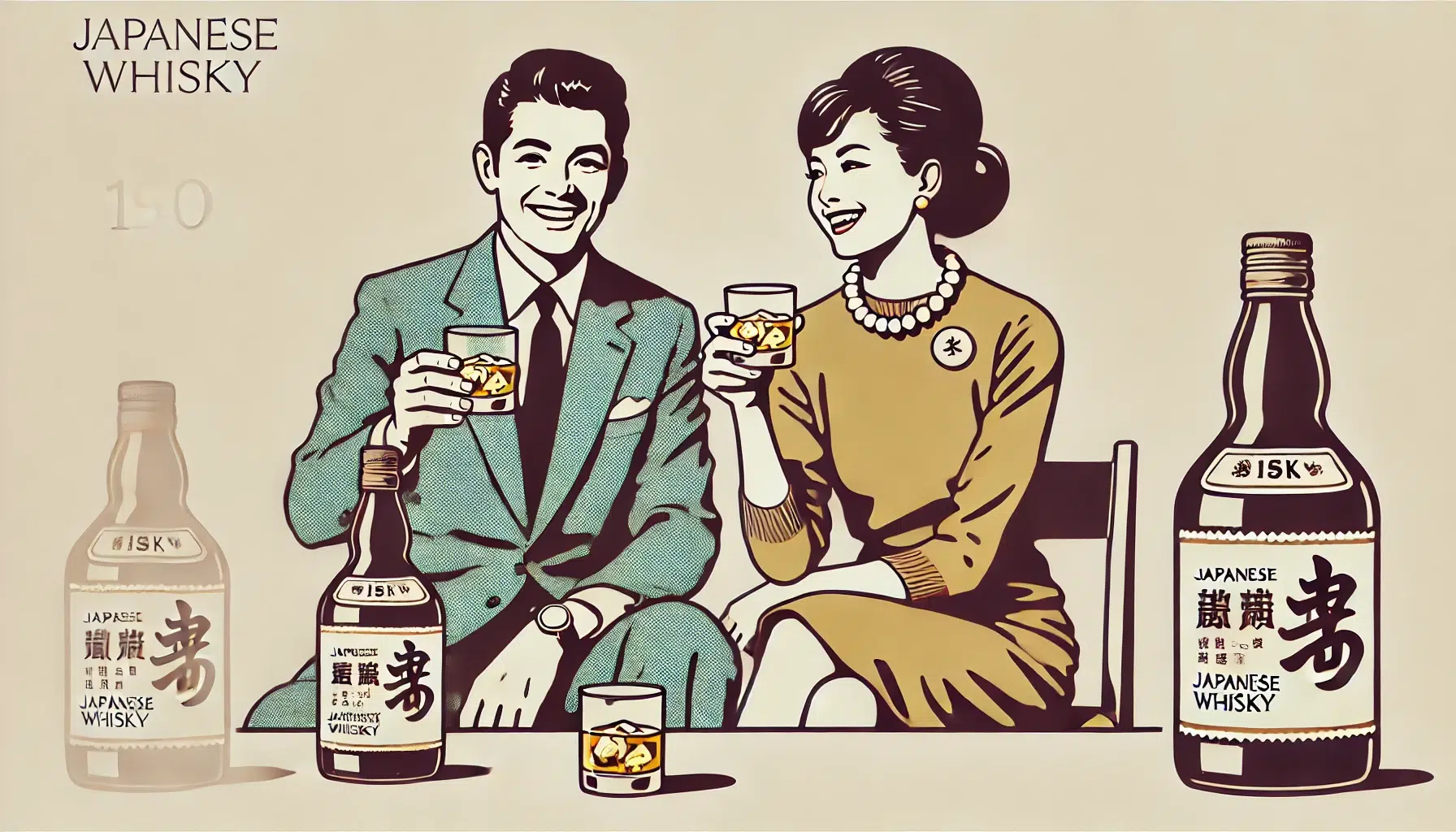Japanese whisky quietly stands out in the global spirits scene with its meticulous craftsmanship and subtle complexity. Key types include Single Malt, Blended, Grain, and Pure Malt, each offering a delicate balance and elegance. American whiskey, on the other hand, is bold and diverse, featuring Bourbon, Tennessee, Rye, Corn, and Wheat Whiskey, each with unique flavors and regional influences. Explore their rich histories, flavors, and food pairings in the following sections.
The Defining Characteristics of Japanese Whisky
Japanese whisky is distinguished by its precision and refinement, reflecting the nation’s cultural dedication to detail and harmony. Distillers in Japan meticulously select their ingredients and follow a careful distillation process, striving for a flavor profile that is smooth, subtle, and yet complex and balanced. The utilization of pristine water sources, often drawn from Japan’s mountainous terrains, contributes significantly to the whisky’s purity and soft mouthfeel.
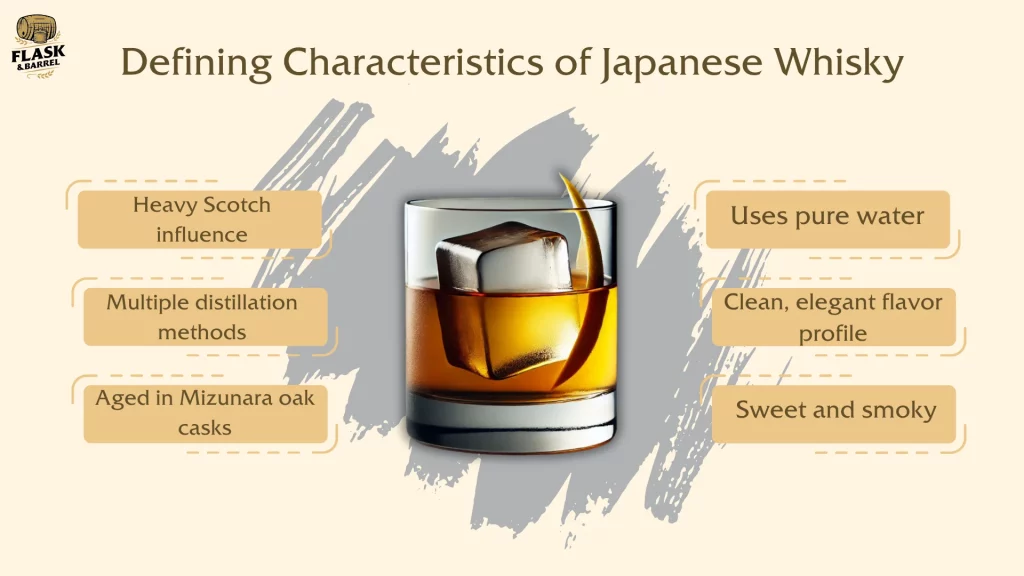
Moreover, Japan’s varied climate, from the cold, snowy winters of Hokkaido to the subtropical warmth of Okinawa, introduces diverse aging conditions, bestowing unique characteristics upon each whisky. Japanese whisky predominantly features malted barley, with some distilleries also exploring the use of other grains, but always with a focus on achieving a harmonious blend. The outcome is a spirit that is highly coveted for its elegance and versatility, appealing to both seasoned enthusiasts and newcomers to the whisky world.
This careful balance of flavors and the emphasis on craftsmanship underscore the unique position of Japanese whisky in the global spirits landscape. Distilleries like Yamazaki and Hakushu are prime examples of this dedication, producing whiskies that are highly regarded for their quality and complexity. Yamazaki 12 Year Old, for instance, is celebrated for its rich fruitiness and smooth finish, while Hakushu 12 Year Old offers a fresher, lightly smoky experience that reflects its forested mountain surroundings.
These expressions, among others, highlight the unique flavor profiles and meticulous production methods that define Japanese whisky.
The Defining Characteristics of American Whiskey
American whiskey is celebrated for its bold flavors and rich diversity, anchored in a heritage of innovation and pioneering spirit. The landscape is dominated by distinctive styles such as Bourbon, Tennessee, Rye, and Corn Whiskey, each with unique flavor profiles shaped by specific production processes and regional influences. Wheat Whiskey offers a softer, smoother alternative, enriching the category’s variety.
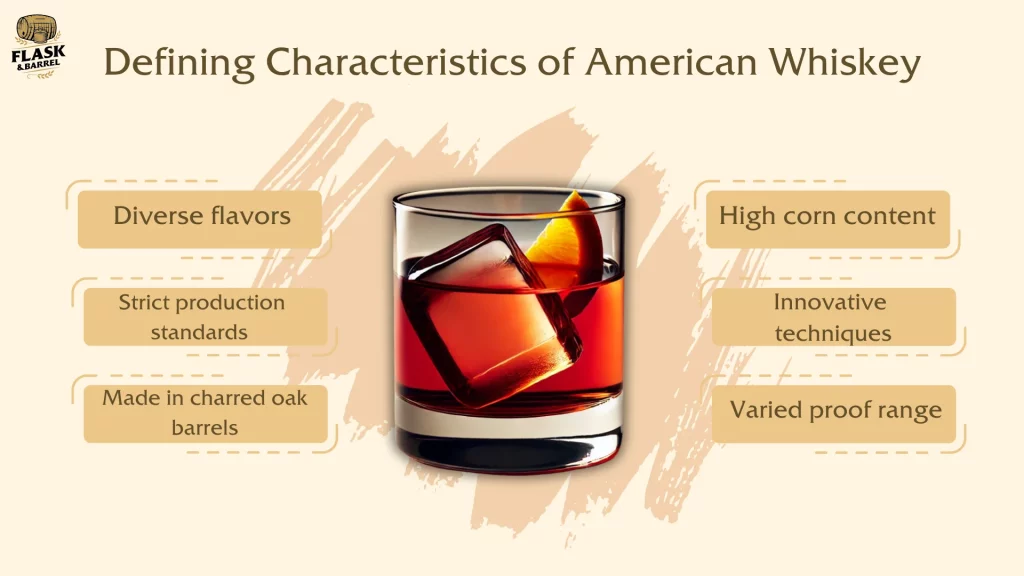
Iconic brands such as Jack Daniel’s and George Dickel epitomize Tennessee whiskey with their signature charcoal mellowing process, which imparts a smooth, distinctive character. Meanwhile, Buffalo Trace and Maker’s Mark stand as paragons of Bourbon, showcasing the deep, rich flavors and complexity that come from meticulous aging in charred new oak barrels. These distilleries, among others, embody the boldness and diversity of American whiskey, offering a range of flavors from the sweet, vanilla and caramel notes typical of Bourbon to the spicy, fruity undertones characteristic of Rye whiskey.
A hallmark of American whiskey is the aging process in charred oak barrels, which imbues the spirit with deep, complex flavors and a signature richness. Particularly, Bourbon is legally required to contain at least 51% corn in its mash bill, alongside stringent regulations regarding its production and aging, setting a clear framework that defines American whiskey. This robust character and versatility have made American whiskey a beloved choice among enthusiasts, suitable for sipping neat, on the rocks, or as the foundation for a wide range of classic and contemporary cocktails.
In What Ways Are They Similar?
Despite originating from different corners of the globe, Japanese whisky and American whiskey share a foundation built on heritage, craftsmanship, and innovation. Both spirits embrace the tradition of aging in wooden barrels, a critical step that significantly shapes their flavor profiles. Moreover, they are governed by strict regulations that ensure the quality and authenticity of each bottle.
The influence of Scottish distillation techniques on Japanese whisky making is a prime example of shared heritage, where Japanese distillers have adopted and refined these methods to create whiskies that are both unique and reminiscent of their Scottish counterparts. Enthusiasts around the world enjoy these spirits in a variety of ways—whether neat, on the rocks, or as the cornerstone of complex cocktails. This common ground underscores the universal appeal of whiskey, showcasing how two distinct traditions can converge in the shared pursuit of excellence.
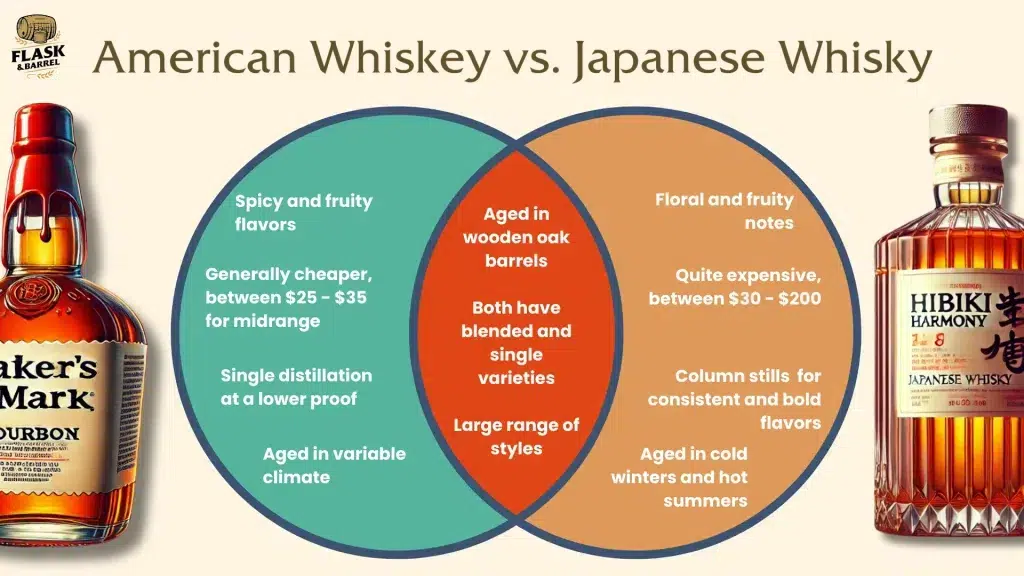
In What Ways Are They Different?
Japanese whisky and American whiskey are set apart by distinct flavor profiles, production techniques, and cultural backgrounds. Japanese whisky is celebrated for its elegance and subtlety, often presenting lighter, more refined flavors with a smooth finish, mirroring the Japanese dedication to balance and precision. On the other hand, American whiskey, especially Bourbon and Rye, is known for its boldness and robustness, featuring a pronounced sweetness or the spicy complexity that comes from its primary grains.
The aging environment significantly influences their differences, with Japan’s varied climate offering diverse aging conditions, contrasting with the specific regional climates of the U.S. that define American whiskey’s aging process. For example, the cold, snowy winters of Hokkaido can slow the aging process, allowing for a more gradual maturation, while the hot, humid summers of Kentucky accelerate the interaction between the whiskey and the charred oak barrels, intensifying the flavors.
Furthermore, legal definitions and regulations in each country prescribe certain production practices, such as the mandatory use of new, charred oak barrels for Bourbon, which must be aged for a minimum of two years to be considered straight Bourbon, versus the more flexible barrel usage in Japanese whisky production, where there is no legal requirement for the type of barrels used or minimum aging period.
Comparing Japanese Whisky and American Whiskey
Comparing Their Flavor
| Japanese Whisky Example | Flavor Profile | American Whiskey Example | Flavor Profile |
|---|---|---|---|
| Hibiki Japanese Harmony | Floral and fruity notes, smooth finish | Wild Turkey Bourbon | Bold, sweet notes, rich character |
Comparing Their Price Range
| Type | Example | Price Range |
|---|---|---|
| Japanese Whisky | Yamazaki 12 Year Old | Premium |
| Japanese Whisky | Nikka Coffey Grain Whisky | Mid-range |
| American Whiskey | Pappy Van Winkle’s Family Reserve 15 Year | Ultra-premium |
| American Whiskey | Buffalo Trace Bourbon | Budget-friendly |
Comparing Their Distillation Process
| Feature | Japanese Whisky | American Whiskey |
|---|---|---|
| Still Types | Pot stills and column stills for diverse flavor profiles | Predominantly column stills for consistent, bold flavors |
| Aging | Varied climate impacts aging, often in used barrels | New, charred oak barrels mandatory for Bourbon, impacting flavor |
Comparing Their Popularity
| Metric | Japanese Whisky | American Whiskey |
|---|---|---|
| Sales Figures | Rising, especially in premium segments | Broadly popular, with significant market share in spirits |
| Export Growth | Significant increase, particularly in Asia and Europe | Steady growth, with strong demand in Europe and Asia |
| Distillery Visits | Increasing, with tourism focused on distillery experiences | High, with a strong culture of distillery tours in the US |
Comparing Their Critical Acclaim
| Award/Recognition | Japanese Whisky Example | American Whiskey Example |
|---|---|---|
| International Spirits Competition | Yamazaki Sherry Cask 2013 – World Whisky of the Year | George T. Stagg – Multiple Gold Medals |
| Consumer Ratings | Hibiki 21 Year Old – Extremely high ratings | Buffalo Trace Antique Collection – Highly rated across platforms |
Who Is Japanese Whisky Best For?
Japanese whisky is ideally suited for those who value subtlety, complexity, and elegance in their spirits. It resonates with connoisseurs and enthusiasts who seek a refined drinking experience, characterized by nuanced flavors and a harmonious balance. Perfect for individuals eager to venture beyond traditional whisky landscapes, Japanese whisky presents a unique taste profile that is sophisticated yet approachable.
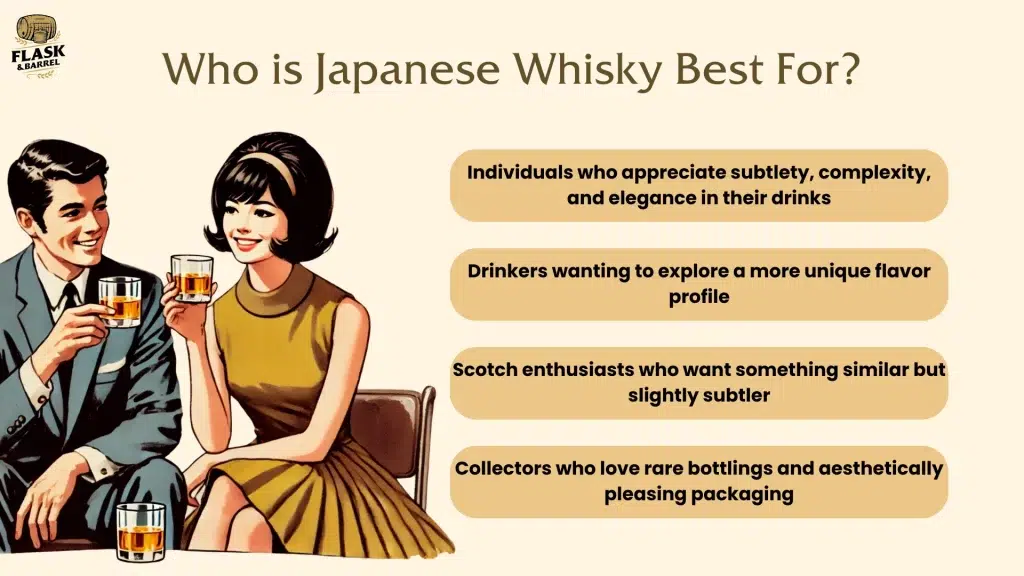
Collectors, drawn to the exclusivity and artistry of Japanese distilleries, will find these whiskies a prized addition to their collections. Whether savored neat, with a splash of water, or as part of a delicate cocktail, Japanese whisky is tailored for those with a discerning palate and an appreciation for the intricate art of whisky making. Specific Suggestions for Drinkers and Occasions:
- For the Culinary Adventurer: Japanese whisky pairs exceptionally well with a wide range of cuisines, from the delicate flavors of sushi and sashimi to the rich, umami-laden dishes of Japanese barbecue. Its versatility makes it an excellent companion for dining experiences seeking to elevate the meal with a complementary spirit.
- For the Collector: Limited editions and rare bottlings from renowned distilleries like Yamazaki, Hibiki, and Nikka offer unique opportunities for collectors. These whiskies not only serve as a testament to the craftsmanship of Japanese distilling but also as valuable investments and cherished items for special occasions.
- For the Cocktail Aficionado: The subtlety and complexity of Japanese whisky make it an intriguing base for cocktails that require a refined spirit. Classic cocktails with a twist, such as the Japanese Highball or a Whisky Sour made with Japanese whisky, highlight its unique flavor profile, offering a sophisticated drinking experience.
- For the Gift Giver: A beautifully crafted bottle of Japanese whisky is a thoughtful and prestigious gift for whisky lovers and novices alike. It’s an excellent choice for celebrating milestones, achievements, or as a gesture of appreciation, offering a taste of Japanese elegance and tradition.
Incorporating these specifics into the section not only enriches the content but also provides readers with tangible recommendations and scenarios where Japanese whisky can be best appreciated, enhancing the overall helpfulness and relevance of the advice.
Who Is American Whiskey Best For?
American whiskey is the ideal choice for those who relish bold flavors and a rich, full-bodied experience. It appeals to a wide range of drinkers, from casual enthusiasts to dedicated aficionados, who value the depth and diversity inherent in its various styles. Whether one is drawn to the sweet, caramel notes of Bourbon, the spicy complexity of Rye, or the smooth character of Tennessee whiskey, there is an American whiskey that caters to every preference.
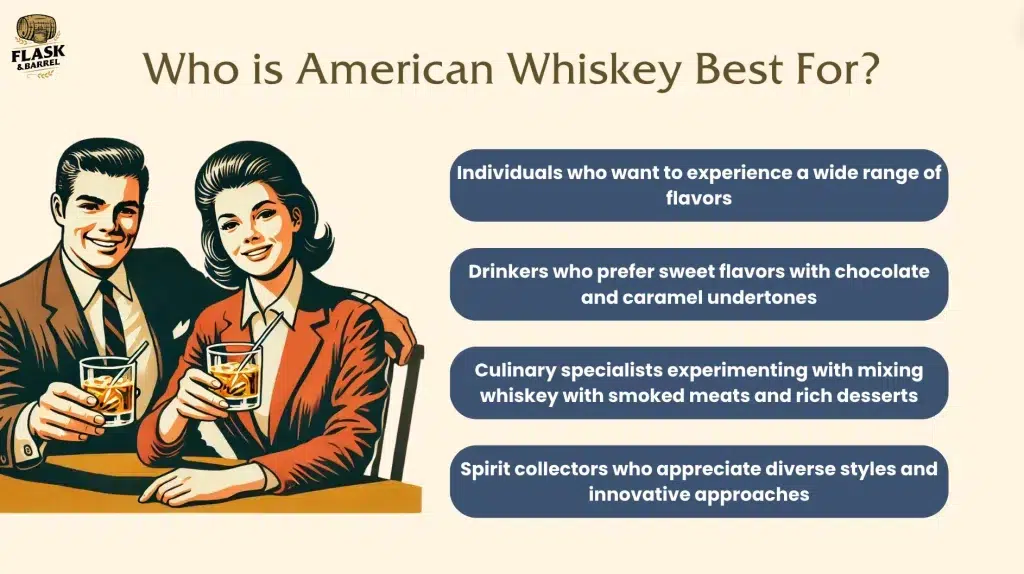
Moreover, it stands as a favorite among cocktail enthusiasts, offering a robust base that complements both timeless and novel drink recipes. Collectors and connoisseurs will also find allure in the limited editions and artisanal expressions that highlight the innovation and heritage of American distilling. Ultimately, American whiskey is for anyone captivated by its rich history, versatility, and the simple joy of savoring a meticulously crafted spirit.
Recommendations Based on Consumer Preferences
- For Newcomers:
- Bourbon with its sweet, approachable profile, such as Buffalo Trace or Maker’s Mark, is an excellent starting point. These whiskies offer a smooth introduction to the category, perfect for those new to the world of spirits.
- Cocktails: Try a classic Old Fashioned or Whiskey Sour to appreciate the versatility of American whiskey in mixed drinks.
- For Seasoned Drinkers:
- Rye Whiskey, known for its spicy and complex flavor, offers a bolder tasting experience. Whiskies like Rittenhouse Rye or Sazerac Rye are highly recommended for those looking to explore deeper into the whiskey spectrum.
- Cocktails: A Manhattan or a Sazerac showcases the robust character of rye whiskey, providing a sophisticated drinking experience.
- For Collectors:
- Limited editions and single barrel releases from distilleries like Pappy Van Winkle, Blanton’s, and Elijah Craig offer unique and sought-after profiles for collectors and enthusiasts alike.
- For Cocktail Enthusiasts:
- Tennessee whiskey, such as Jack Daniel’s or George Dickel, serves as a smooth, versatile base for a wide range of cocktails, from the Tennessee Mule to the Lynchburg Lemonade.
By catering to the varied tastes and interests of its audience, American whiskey proves to be a dynamic and inclusive spirit, welcoming all to discover its rich flavors and storied heritage.

